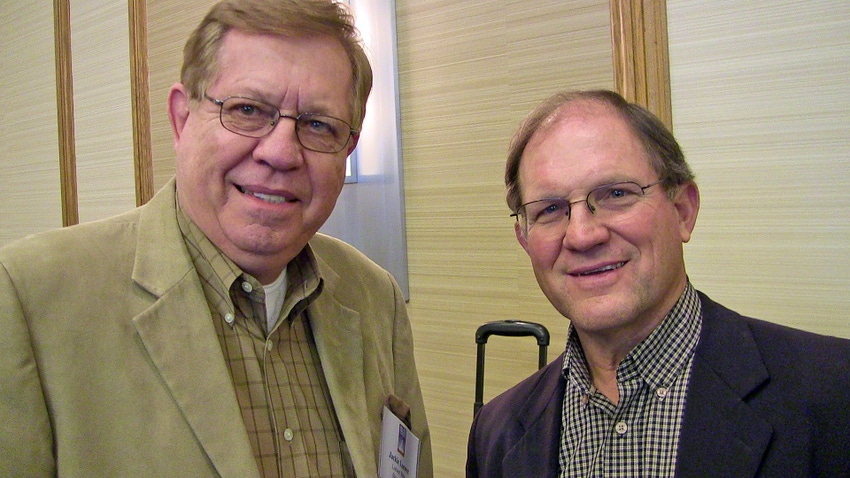
Management principles can help farms continue to succeed
“About half of all family-owned businesses fail to make it to the second generation,” says Wittman, who owns Wittman Consulting Services and works with farming operations all over the country besides being CEO of the 19,000-acre farm.“I’ve had the privilege of being in agriculture from many different perspectives, as a farmer, as a consultant, as a former lender as a setter of policy,” Wittman said. “People are in our industry primarily because they like to grow things. In order to excel at it, we need to be equally skilled in managing people, managing finances.
December 24, 2013

Dick Wittman is the managing partner in a 19,000-acre dry-land crop, range cattle and timber operation in northern Idaho. The family business is in its third generation and has four family partners as its principals. That can be a recipe for disaster, he says.
Wittman Farms started out like many others. A father and two uncles laid the basic foundation for the operation decades ago. By the 1970s, the family had 25 first cousins who were potential successors to running the farm. Basically, the operation had eight transition events in 28 years.
Family-owned businesses go through three stages, according to author John Ward, who Wittman quotes. The first is owner-managed; the second, sibling partnership; and the third, cousin collaboration. Thirty years ago, 5 percent to 10 percent were run by siblings. Now 50 percent are owned and run by brother/sister groups.
“About half of all family-owned businesses fail to make it to the second generation,” says Wittman, who owns Wittman Consulting Services and works with farming operations all over the country besides being CEO of the 19,000-acre farm. He spoke on “Building Effective Farm Business Management Systems" at the USA Rice Outlook Conference in St. Louis, Mo.
'Different perspectives'
“I’ve had the privilege of being in agriculture from many different perspectives, as a farmer, as a consultant, as a former lender as a setter of policy,” Wittman said in an interview. “People are in our industry primarily because they like to grow things. In order to excel at it, we need to be equally skilled in managing people, managing finances.
“As we’ve grown in the technology of our industry and gotten more sophisticated in our production practices, we can’t excel unless we grow our governance processes, our ways of managing finance, our human resource management functions. All those things have to be hitting on all cylinders.”
Family businesses that excel, he said, see the value of sitting as a group and formalizing structures, discussing and ending up with things in writing where they clearly define their mission, their vision and their values.
“They clearly define the duties and responsibilities that people hold in the business. People clearly have segments of the business that they know they manage so they can acquire the right skills and do the right kind of development to do well at that,” he notes.
Successful family businesses sit as a group and define the policies and standard operating procedures they intend to follow so there is consistency and fairness in the way they operate. They have good measurement systems where they look at financial performance on a regular basis, and they share that information.
“Their communication culture is clearly defined, and they set high standards of professionalism where people are expected to treat each other with integrity and respect,” Wittman says. “It’s the whole system, and that’s your management engine. When you look at all those pieces, and you sum them up, it’s no different than an engine in your combine or your truck. And any one of those pieces that is not operating at perfection will cause that engine to self-destruct.”
Wittman said he used to put a list of what he called tragic stories at the end of his presentation. This list included a series of examples of family-owned farming operations that did not end well.
Dream of succession
The situations – such as a Mom and Dad and four sons with a dream of succession; two cousins with under-utilized, but expensive combines; $150,000 in attorney fees to divide a farm following a messy divorce; $600,000 in lost efficiency to divide a family partnership; grandkids at a farm sale closing wondering what might have been – all produced predictable outcomes.
“One day someone suggested that I list those closer to the front of the presentation,” he said. “If you don’t show them until the end, some people won’t realize how much this pertains to their own individual situation. So I started doing that.
What has Wittman learned after 36 years of working with farm businesses? “My No. 1 conclusion is that you never make a decision until you put it on paper,” he said. “Everything –mission statements, job descriptions, succession plans, profit-sharing – all needs to be written down on paper.”
For more information, go to www.wittmanconsulting.com
http://www.usarice.com/index.php?option=com_events&event_id=519&view=subpage&id=99&Itemid=187
http://deltafarmpress.com/management/son-ready-manage-qualls-partnership
About the Author(s)
You May Also Like





